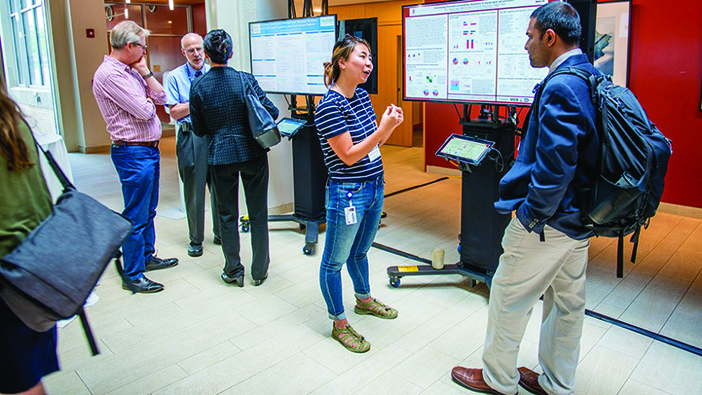Five-year, $19.9M grant to Advance-CTR will support scientists in taking their work from bench to bedside to the people of Rhode Island.
Since 2016, the Brown University-based, federally funded Advance Clinical and Translational Research program has supported biomedical and public health scholars across Rhode Island who are working to turn scientific discoveries into solutions that can improve the lives of patients.
This month, the National Institute of General Medical Sciences awarded Brown, the host institution on the federal award, a $19.9 million grant to fund Advance-CTR’s expansion into a second five-year phase.
The program funds clinical and translational research—at its core, research that starts in laboratories and progresses into clinical and community settings and makes a positive impact on people’s health through diagnosis, treatment, or policy change—and provides education and professional resources to early-career investigators across Rhode Island.
The successful partnership across the major research institutions in the state has resulted in a surge in translational research, according to University leaders.
“Advance-CTR has been instrumental in helping us realize our vision for expanding translational research, both at Brown and with key partners in the affiliated hospitals and URI,” says Jack A. Elias, MD, senior vice president for health affairs and dean of medicine and biological sciences. “It’s been a factor in seeding grants that have led us to a 186 percent increase in external research funding over the past few years. You can’t make leaps like that unless you have the infrastructure, training and mentoring that Advance-CTR provides.”
Over its first five years, Advance-CTR has become a model for scientific collaboration that crosses academic disciplines, builds on the strengths of multiple partners and ultimately makes a difference for patients, said Sharon Rounds, MD, the program’s director and associate dean for clinical affairs.
“Advance-CTR has created a centralized hub of education, communication and information for all health-focused researchers in the state,” Rounds says. “In terms of leading research and getting projects off the ground to help local communities, the program is an impressive example of how much can be achieved, and how ideas can come to life and visions can be realized when different groups work together.”




